The Greatest Showman was released in 2017 but I didn’t get around to watching it until the Spring of 2018 and it quickly became one of my favorite movies (with its catchy songs topping my ‘most listened to’ tunes in the same year). But I’m not here to review the movie. Instead, I want to share with you what The Greatest Showman can teach you about marketing.
Yes, you heard that right. This movie has so many golden nuggets about marketing and messaging that will help you in your own business.
By the end of this article, you’ll feel inspired knowing how to create compelling messaging that gets your ideal audience to buy without feeling salesy or sleazy.
So let’s dive in!
1. Not everyone’s in it for the money
When P.T. Barnum first sets out to convince Charles to join his team, he doesn’t seem thrilled by the idea saying that Barnum wants people to laugh at him.
Knowing that Charles and his mother are tight on money, he responds:
P.T. Barnum: “They’re laughing anyway, kid, so you might as well get paid”
Barnum believes that Charles will agree to do it for the money. Most likely because he himself is motivated by it and giving his family the lifestyle he never had growing up.
But Charles walks away and locks himself in his room. That’s when Barnun realizes money isn’t what he wants. Not even close.
He wants people to treat him with respect.
So he tries again. This time he offers him a chance to be seen and not only not be laughed at, but be respected. And he comes out smiling, ready to accept the opportunity.
But he didn’t just throw out a few vague statements about respect. That wouldn’t have worked. He took a brief moment to understand him and use his own vision to compel him.
He looked at the paper soldier he found on the floor earlier and used it to paint a picture in Charles’ mind of what’d become possible for him:
P.T. Barnum: “I see a soldier, no, a general, riding across the stage with a sword and a gun and, and… and the most beautiful uniform ever made. And people will come from all over the world and when they see him they won’t laugh… They’ll salute.”
And it resonated because that’s something Charles had imagined and wished for in the past.
Take action:

Free Cheatsheet
Create & Launch Your Course with an easy to follow roadmap!
2. Do you know what you’re selling?
Seems like a silly question, right? But there’s more than meets the eye and you need to be crystal clear on the answer.
Barnum first reaches out to Phillip Carlyle in order to learn how to appeal to the “highbrows” of the city. When he asks Phillip if he produced the play at the nearest theater, he confirms it and immediately jumps to the conclusion that Barnum wants a refund.
When he hears who Barnum is, he admits he hasn’t been to his show but his eyes light up as he says:
Phillip: “People leave your show a great deal happier than when they came in… Which is much more than I can say for my play” — with a slight hint of jealousy.
THIS. This is the key.
Barnum isn’t selling a simple show with acrobatics and interesting people. He’s selling joy, entertainment, fun and most likely a long lasting memory for families attending his show.
People come out feeling happier. That’s the transformation he provides for his customers.
But that’s not the end. Because Barnum follows it up by saying:
P.T. Barnum: “Yet you have no trouble selling tickets” — with almost the same level of jealousy Phillip had about his show.
Phillip: “That’s because I’m selling virtue”
Phillip’s well aware of what he’s selling and who he’s targeting. His plays don’t provide people with just something to watch, they’re most likely not even that good (hence his immediate assumption that Barnum wants a refund).
But they provide those who attend his plays with higher perceived status, class, elegance and power. People who attend his plays probably have a lot of money, a higher education and consider themselves to be a part of the elite.
Attending his plays further reinforces these “traits” for the attendees.
Why do some people buy renowned, luxurious brands instead of a lesser known brand of the same quality? The brand gives you prestige when others see it. The logo alone can make people perceive you as wealthy, classy, powerful, etc.
Phillip is selling virtue, not tickets to a play, that’s why he has an easy time selling tickets.
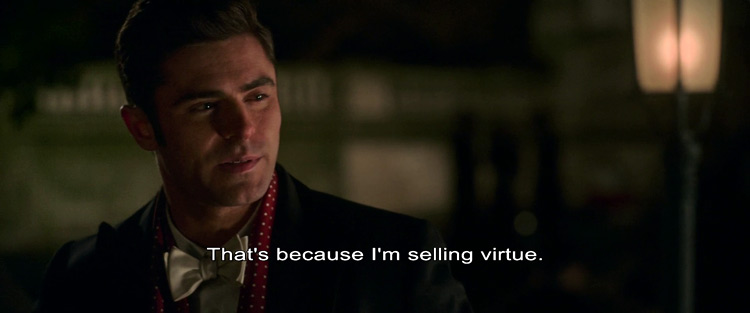
Take action:

Free Cheatsheet
Create & Launch Your Course with an easy to follow roadmap!
3. It’s your job to convince people to go for their dreams
At least if you want them to work with you. Now, this is NOT your permission slip to be pushy, aggressive and salesy. Not at all.
Barnum knows he needs Phillip on his team to be able to reach his target market. So with the help of a few drinks and a catchy song, he proceeds to make a convincing speech to get him to say yes.
This has to be one of my favorite songs and parts of the movie. Not only is it catchy but it just shows you how marketing works in such a powerful way.
Let’s take a look.
Barnum cuts to the chase by telling Phillip he wants to expand and needs his help to target the upper class people to which Phillip responds “If only you knew how suffocating they are”.
This already gives Barnum a hint that Phillip isn’t fully happy in his role and wants more out of life, but he can’t have it without losing his status.
So Barnum starts convincing him with vague arguments about being free, having fun and crushing the walls of his uptown boy life.
And here’s where it gets interesting. While that’s what Phillip wants, he doesn’t give in immediately.
This song is a clear example of how people will fight for their limitations even when they claim they want something else out of life. This is key because *your* audience will fight for their own limitations and it’s your job to help them overcome them.
As expected, Phillip goes on to decline the offer and explain:
Phillip: “I think I’m good to go cause I quite enjoy the life YOU SAY I’m trapped in.”
Ahh, this is important. It’s not enough to tell them, they have to feel it strongly.
If they don’t see it and feel the pain of their circumstances, they’ll push to stay where they are.
Phillip then proceeds to compare his lifestyle with the one he could have if he took Barnum’s offer in a negative way. Instead of focusing on the freedom he desires, he focuses on the possibility of losing his status and end up picking up peanut shells.
He continues singing about the good things about his uptown boy life (in an attempt to convince himself more than Barnum) and how he doesn’t need to see the other side because he’s got everything he needs where he is.
When you present an offer to your audience, even if you promise them something they truly desire, their first instinct will be to say no. They’ll fight for their limitations and tell themselves they don’t need it, they’re doing well and there’s no need to buy your product.
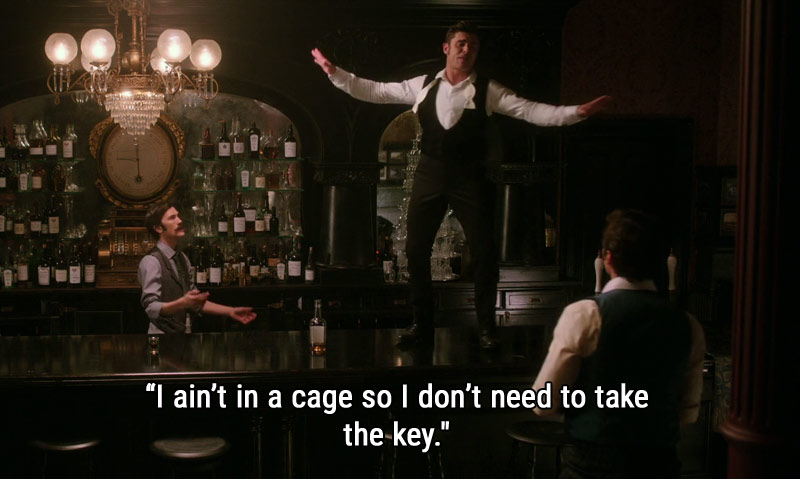
Most entrepreneurs would stop at that. People made their choice so let’s not dig deeper or you’ll be perceived as pushy or salesly. Eek!
But Barnum isn’t about to give up, nope. So having listened to Phillip, he has a better understanding of what motivates him and what’ll take to get him to say yes.
He no longer keeps it vague, he goes hyper specific.
P.T. Barnum: “Is this how you like to spend your days? Whiskey, misery and parties and plays?”
And Phillip returns to his stance of fighting for things to stay the same, but this time he reveals so much more information for Barnum to convince him. He lists his objections and fears, and what’s really holding him back.
Phillip: “If I was mixed up with you I’d be the talk of the town, disgraced and disowned, another one of the clowns.”
So many negative emotions and fears behind one decision. It’s no wonder he doesn’t want to take the chance. You can see it as he walks away that he’s aching and realizing how unhappy he truly is in his current life.
But Barnum has been to the other side and knows what it’s like. He knows what Phillip’s life could be like if he took the chance. So he tells him, clearly.
P.T. Barnum: “But you would finally live a little, finally laugh a little, just let me give you the freedom to dream and it’ll wake you up and cure your aching, take your walls and start ’em breaking… Now that’s a deal that seems worth taking.
But I guess I’ll leave that up to you…”
He puts the decision in Phillip’s hands now. Barnum is letting him go, he’s not singing, nor chasing. Nothing. It’s up to Phillip to go or continue the discussion.
This is powerful because the choice isn’t to join Barnum or keep debating how great life is. Barnum is done debating and Phillip knows this.
The choice now is to stay and pursue his dream life or leave and settle for a life that suffocates him.
This is why deadlines and “cart closing” events drive so many sales. The ticking clock is the virtual representation of this scene. There’s no more convincing, there’s just a decision to be made. You go for your dreams or you settle where you are.
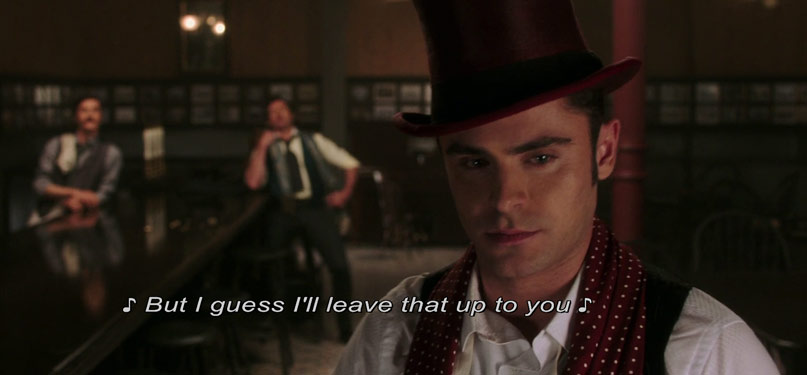
Phillip hesitates for a few seconds, then smirks and begins negotiating. He’s done settling and wants to live his dream life.
But he’s not about to give everything up without reassurance. He’s been wealthy all his life so if he’s going to give up his inheritance and his status, he at least needs to be able to build his own wealth.
With no guarantees of happiness, love, freedom or anything, he needs something tangible. In this case: a cut of the profits.
Phillip: “Well it’s intriguing but to go would cost me greatly. So what percentage of the show would I be taking?”
In your case, this is where you can talk to them about the features of your offer. What’s included, what format it is, which bonuses and extra perks they get, etc.
Isn’t it a powerful scene? Do you see how inspiring it can be to sell when you’re willing to listen to your audience’s needs, desires, fears and aspirations and offer them exactly what they need?
Take action:

Free Cheatsheet
Create & Launch Your Course with an easy to follow roadmap!
4. The real reason people don’t go for their dreams
Closely related to the previous points, but equally as important. We see the characters grapple with this throughout the movie.
Even after deciding to go for it, they still teether at the edge, still afraid of going all in because they know it’s going to cost them.
Phillip becomes a part of the circus and he begins to experience the freedom, fun and even love that was promised. But he continuously chases after and lets Anne go (or rather, she lets go after being disappointed repeatedly) because he knows his family would disown him.
When Barnum is ready to launch the show all of the members of the crew are afraid and don’t want to step onto the stage. Even though they were happy to be a part of it in the beginning — when Barnum showed them his vision. But now that it’s happening, they’re scared of being judged and laughed at.
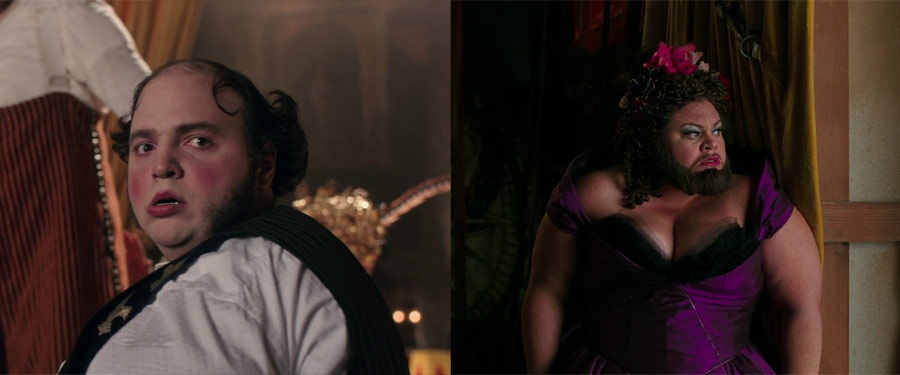
Jenny seems uninterested in Barnum and his show and only begins to care when he tells her he wants to give his audience ‘something real’ for once. She agrees to the ‘one night only’ deal, hesitating to take a bigger chance to conquer America (or Barnum 😉 ) to keep them from finding out her ‘shameful’ past.
They all hesitate to pursue what’s in their hearts because they know doing so requires they ask themselves the most important question of all:
What’s it going to cost you?
What’s the cost of you going for your dreams? What will you lose in order to gain what you desire?
The cost can sometimes be very straightforward. For instance, it’s going to cost Phillip his inheritance and his reputation to be with Anne.
But other times it’s a different kind of price. It will cost you your identity.
Both the amazing humans of the show and Jenny have to give up the old stories they told themselves and step into new, more empowering identities.
Who is the version of themselves that is unafraid of what people will say, confident in their ability to show up and make people happy, and even more so to see the inherent value in them?
Jenny mentions she was born out of wedlock and that brought shame upon her and her family and left a void that no ovation could ever fill.
When Jenny learns more about Barnum’s own past, she connects with him deeply. He sees her for who she is and not for her talents or even for how she came into the world. He makes her feel seen.
That fills the void in her heart, helping step into the identity of someone who can tour North America, unafraid of what a whole other continent would think if they found out about her past.
But Jenny’s true desire wasn’t to be more famous, earn more money or get more praise. She wanted something meaningful with someone real. She hesitates to go for it as well.
She knows the price. Breaking up a happy family and bringing more shame upon herself for doing so.
In the end it costs her heartbreak when Barnum turns her down. She goes back to her old identity because she didn’t believe she was truly worthy, Barnum made her feel that way and with him gone, so did the belief.
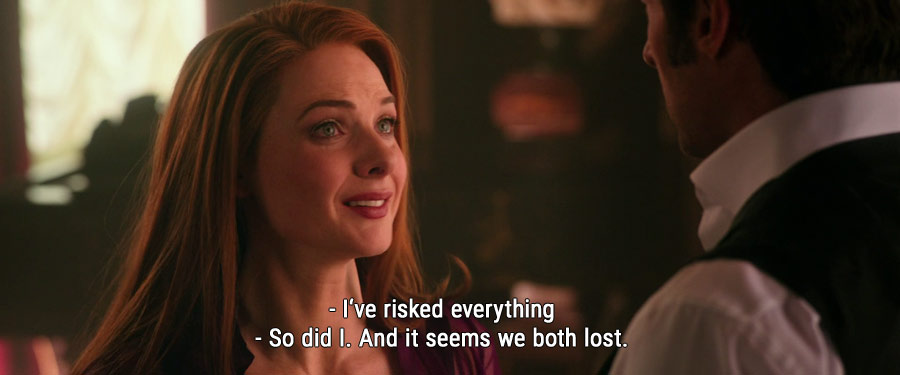
Barnum is taking chances and going for his dreams throughout the movie. But, unlike the other characters, he doesn’t stop to think of what it’s going to cost him.
Not considering the cost before deciding led him to chase after shiny objects and eventually costs him his whole dream and his family.
This is important for two reasons. You need to have a clear understanding of what it’s going to cost your audience to work with you and to buy from you.
But also what it’s going to cost YOU to make certain decisions in your business that may lead to incredible success or to its demise.
Take action:

Free Cheatsheet
Create & Launch Your Course with an easy to follow roadmap!
5. Don’t lose sight of your why
This brings us to the final point of this post (for now!). This one is more about you, the entrepreneur with a vision.
You start your journey with so much passion and determination. You work hard, pour your everything into your business and you believe that ‘a million dreams is all it’s going to take’.
But after a while you start losing hope when you see your business isn’t where you expected it to be. So you begin chasing shiny objects in hopes that they’ll give you your big breakthrough.
Or worse, you grow fast and achieve your goals, one after the other, but it’s not enough. You continue to chase milestone after milestone, without even knowing why.
It just seems logical to go after 7 figures when you’ve hit 6 figures, right?
But is that what you want?
You may find yourself trying new things that have little to do with your vision for your business. It doesn’t feel exciting anymore, or you’re doing them because you want to achieve something that your current business won’t be able to provide.
We see this throughout the movie as Barnum builds his show. In the beginning he is focused and everything he does is to build his business and make his vision a reality.
But he realizes that even though his show is successful and profitable, it can’t give him what he most desires. Respect.
People don’t respect him or think of him as one of those classy men like Charity’s father. He wants to appeal to the “highbrows” and eventually realizes he just won’t be able to do so with his own show.
So he enlists the help of Jenny Lind to achieve it but it still doesn’t work.
Mr. Hallett: “All that fortune and still just the tailor’s boy.“
Very similar to the previous section, the wealth didn’t change Barnum’s identity. He didn’t believe he was innately deserving of respect. He had to receive it from others, especially those who wronged him once.
Not getting the respect even after acquiring wealth pushes Barnum to focus so much on Jenny and the prestige she brings him, that he neglects his own show.
Phillip: “Your attention has been divided long enough. (…) They come to see *you*. Your crazy ideas. Your new acts.“
Even after the warnings from his team, he still focuses on Jenny and everything crumbles down when Jenny quits and the building is set on fire.
It’s only after losing everything and being back at square one that Barnum realizes why he was doing what he was doing. What his original vision was. What truly mattered to him.
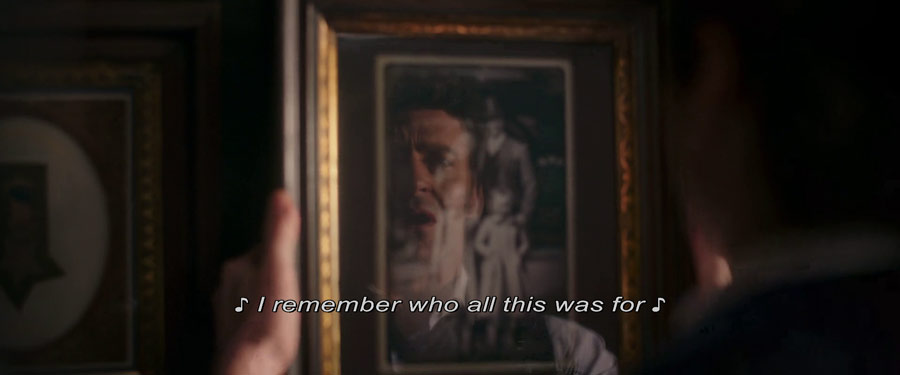
It’s important to stay focused on your why and your vision for your business. If an opportunity isn’t in alignment with your vision, don’t take it, no matter how appealing it is.
It will only lead you astray.
Stay connected to your why and your vision and you’ll get there.
Take action:
Over to you – Which of the marketing and messaging tips resonated the most with you?
This movie is so incredible. And it’s full of useful advice for business owners and entrepreneurs, even if you’re in a completely different niche.
From improving your messaging and becoming a killer copywriter by getting to know your audience, to converting more sales to staying focused on your vision. This movie is full of golden nuggets of wisdom you should not ignore.
Let me know which of the tips resonated the most with you!
There are so many other tips in this movie, I may make a part 2 down the line!
Until then… You can download my FREE cheatsheet to Create & Launch your course with an easy to follow roadmap.

Free Cheatsheet
Create & Launch Your Course with an easy to follow roadmap!

Nice post. I learn something totally new and challenging on sites I stumbleupon everyday. It will always be helpful to read articles from other writers and use something from other sites.
Thank you so much for enjoying it! 🙂